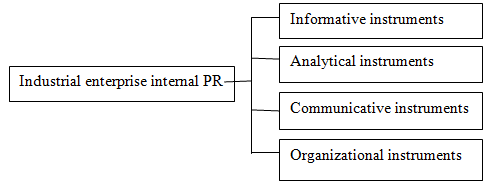About Us
Executive Editor:Publishing house "Academy of Natural History"
Editorial Board:
Asgarov S. (Azerbaijan), Alakbarov M. (Azerbaijan), Aliev Z. (Azerbaijan), Babayev N. (Uzbekistan), Chiladze G. (Georgia), Datskovsky I. (Israel), Garbuz I. (Moldova), Gleizer S. (Germany), Ershina A. (Kazakhstan), Kobzev D. (Switzerland), Kohl O. (Germany), Ktshanyan M. (Armenia), Lande D. (Ukraine), Ledvanov M. (Russia), Makats V. (Ukraine), Miletic L. (Serbia), Moskovkin V. (Ukraine), Murzagaliyeva A. (Kazakhstan), Novikov A. (Ukraine), Rahimov R. (Uzbekistan), Romanchuk A. (Ukraine), Shamshiev B. (Kyrgyzstan), Usheva M. (Bulgaria), Vasileva M. (Bulgar).
Goryacheva O. N.
A candidate of philological sciences, an assistant professor of mass communications in Naberezhnochelninsky Institute (branch) of Kazan (Privolzhsky) Federal University.
Industrial enterprise internal PR.
Internal PR provides the broadcast of company mission, its values and aspirations of the business to employees and involves active work in building harmonious and mutually beneficial relations with the administration of the company staff. The main components of corporate culture are coordinated teamwork units and employees in the company; high level of self-discipline and recognition of employee priority to the company.
To develop a set of measures to promote corporate culture with the help of the internal PR means for industrial enterprises it is necessary to explore the theoretical foundations of corporate culture, analyze its operation in the enterprise.
Modern society recognizes the importance of the individual and its role in the social division of labor, so the formation of corporate culture becomes a priority in most enterprises. The effectiveness of the corporate culture is largely dependent on the consistency and "team spirit"; job satisfaction and commitment to high labor results; loyalty to the organization; willingness to modernize. In many industrial enterprises the system of internal communications, which is presented in Figure 1, is widespread.

Figure 1. Industrial enterprise internal PR.
It should be noted that the enterprise management usually uses these instruments of internal PR, components of which are contained in Table «Components of internal PR instruments», separately:
|
Informative instruments |
Analytical instruments |
Communicative instruments |
Organizational instruments |
|
Internal media, website, stands, leaflets, oral and written communications |
Mailboxes, questionnaires, focus groups, monitoring personnel. |
Industry holidays, systematic corporate training, professional competitions, etc. |
meetings, meetings, management performances, development and implementation of corporate standards, etc. |
The assessment of internal PR quality is complicated. The existing instruments of internal PR are used disproportionately. It is necessary to carry out regular activities using quantitative and qualitative indicators. It is advisable to strain after the organization that is similar to a big family, where all working together are focused on long-term relationships and attach high value to degree to team spirit and its moral climate.
The main thing in the formation of corporate culture is its development and adjustment using the recommendations of consulting firms and the valuable experience of other companies. For the removal of disadvantages and efficiency improvement of corporate culture functioning, the development of PR activities series is possible.
At the first stage it is important to assess the current corporate culture and develop recommendations for the implementation considerations of the PR activities series into enterprise activity.
The second stage involves the creation of a unified information space, includes thematic meetings with psychologists, PR-specialists, managers from consulting firms, the holding of the training to improve cross-functional interaction.
The third stage is the development of interpersonal rules of conduct in the workplace and the creation of a corporate code.
The fourth step is to strengthen the loyalty of staff, to introduce the terminal to vote, to establish communications between the employee and the employer.
At the final stage, the control and the development of new strategies to strengthen corporate culture is carried out.
These steps are aimed at strengthening the feedback and monitoring of employee satisfaction. Proposed range of PR activities is aimed at producing significant social impact and effectiveness of the industrial enterprise.
Goryacheva O.N. Industrial enterprise internal PR. International Journal Of Applied And Fundamental Research. – 2014. – № 2 –
URL: www.science-sd.com/457-24578 (01.07.2025).











 PDF
PDF